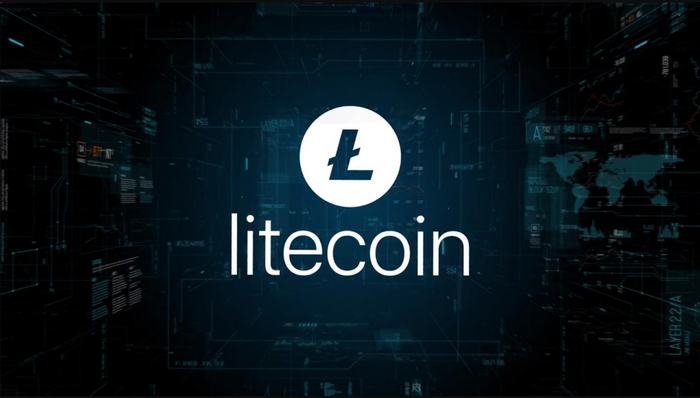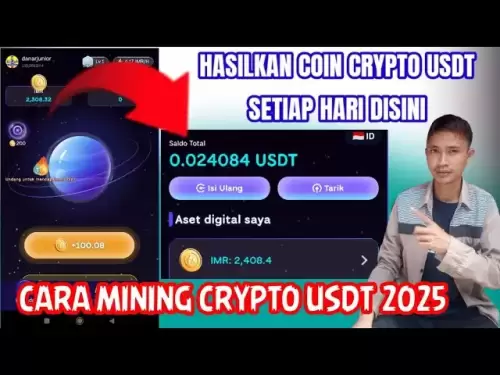-
 Bitcoin
Bitcoin $105,278.9859
4.61% -
 Ethereum
Ethereum $2,414.7741
8.20% -
 Tether USDt
Tether USDt $1.0007
0.05% -
 XRP
XRP $2.1600
7.53% -
 BNB
BNB $639.5433
3.75% -
 Solana
Solana $144.3830
9.37% -
 USDC
USDC $1.0001
0.02% -
 TRON
TRON $0.2742
3.84% -
 Dogecoin
Dogecoin $0.1640
8.57% -
 Cardano
Cardano $0.5811
7.49% -
 Hyperliquid
Hyperliquid $37.2466
5.28% -
 Sui
Sui $2.8243
14.84% -
 Bitcoin Cash
Bitcoin Cash $460.8816
2.22% -
 Chainlink
Chainlink $12.9580
11.75% -
 UNUS SED LEO
UNUS SED LEO $9.1359
1.23% -
 Avalanche
Avalanche $18.2302
10.30% -
 Stellar
Stellar $0.2463
7.80% -
 Toncoin
Toncoin $2.9151
7.18% -
 Shiba Inu
Shiba Inu $0.0...01163
9.79% -
 Hedera
Hedera $0.1532
14.01% -
 Litecoin
Litecoin $85.3310
6.29% -
 Monero
Monero $308.8215
2.90% -
 Ethena USDe
Ethena USDe $1.0007
0.03% -
 Polkadot
Polkadot $3.4259
9.42% -
 Dai
Dai $1.0002
0.01% -
 Bitget Token
Bitget Token $4.1742
3.19% -
 Uniswap
Uniswap $6.8272
8.53% -
 Pepe
Pepe $0.0...09939
12.29% -
 Pi
Pi $0.5358
6.03% -
 Aave
Aave $257.3092
12.83%
What kind of coin is Litecoin? A comprehensive introduction to the Litecoin project in one article
Litecoin, a decentralized cryptocurrency created by Charlie Lee, offers faster transaction times, lower fees, and a larger supply limit compared to Bitcoin, making it suitable for various use cases including payments, remittances, and gaming.
Oct 14, 2024 at 08:00 pm

What is Litecoin: A Comprehensive Guide to the Litecoin Project
1. Overview
Litecoin (LTC) is a decentralized, peer-to-peer cryptocurrency that was created in 2011 by former Google engineer Charlie Lee. It is based on the same core technology as Bitcoin but with some key technical differences.
2. Technical Features
- Scrypt Algorithm: Litecoin uses the Scrypt hashing algorithm, which is more computationally intensive than Bitcoin's SHA-256 algorithm. This makes Litecoin more difficult to mine, ensuring a more decentralized distribution.
- Block Generation Time: Litecoin generates blocks every 2.5 minutes, which is four times faster than Bitcoin's 10-minute block time. Faster block generation improves transaction speed and confirmation time.
- Supply Limit: Litecoin has a fixed supply of 84 million coins, which is four times that of Bitcoin. This supply limit is designed to prevent inflation and maintain scarcity.
3. Use Cases
Litecoin is primarily used as a payment system, similar to Bitcoin. However, due to its faster transaction times and lower fees, it has gained popularity for certain use cases:
- Everyday Transactions: Litecoin's fast and affordable transactions make it suitable for daily purchases, such as online shopping and microtransactions.
- Remittances: Litecoin can be used to transfer money across borders quickly and with minimal fees, making it an attractive option for remittances.
- Gaming: Litecoin is integrated into various gaming platforms, enabling gamers to purchase in-game items and participate in virtual economies.
4. Market Performance
Since its launch, Litecoin has become one of the most valuable cryptocurrencies in the world. Its market capitalization has reached billions of dollars, and it consistently ranks among the top 10 cryptocurrencies in terms of market dominance.
5. Mining
Litecoin is mined using the Scrypt algorithm, as mentioned earlier. Miners use specialized hardware called ASIC (Application-Specific Integrated Circuit) miners to solve complex mathematical puzzles and earn rewards in the form of LTC.
6. Adoption
Litecoin has gained significant adoption within the cryptocurrency community. It is accepted by a wide range of merchants and payment processors worldwide. Additionally, Litecoin has gained support from notable figures in the industry, including PayPal co-founder Max Levchin.
Conclusion
Litecoin is a valuable and established cryptocurrency with unique technical features that differentiate it from Bitcoin. Its fast transaction times, low fees, and decentralized network make it a viable alternative for everyday transactions, remittances, and other use cases. As the cryptocurrency landscape continues to evolve, Litecoin remains a strong contender for long-term success.
Disclaimer:info@kdj.com
The information provided is not trading advice. kdj.com does not assume any responsibility for any investments made based on the information provided in this article. Cryptocurrencies are highly volatile and it is highly recommended that you invest with caution after thorough research!
If you believe that the content used on this website infringes your copyright, please contact us immediately (info@kdj.com) and we will delete it promptly.
- Celestia Under Fire: Navigating the $100M FUD Storm
- 2025-06-24 16:45:12
- XLM Price, Bitcoin Solaris, and Returns Prediction: Navigating the Crypto Landscape
- 2025-06-24 16:25:13
- Dogecoin Price Prediction: Will DOGE Bounce Back by June 25?
- 2025-06-24 16:45:12
- Adam Schiff's COIN Act: Curbing Crypto Endorsements and Conflicts of Interest
- 2025-06-24 16:25:13
- Bitcoin, Ethereum, Ceasefire: Crypto Markets React to Unexpected Geopolitical Developments
- 2025-06-24 17:05:12
- PIPE Transactions, On-Chain Protocols, and Market Analysis: A New Era for Crypto?
- 2025-06-24 17:24:16
Related knowledge

How to customize USDT TRC20 mining fees? Flexible adjustment tutorial
Jun 13,2025 at 01:42am
Understanding USDT TRC20 Mining FeesMining fees on the TRON (TRC20) network are essential for processing transactions. Unlike Bitcoin or Ethereum, where miners directly validate transactions, TRON uses a delegated proof-of-stake (DPoS) mechanism. However, users still need to pay bandwidth and energy fees, which are collectively referred to as 'mining fe...

USDT TRC20 transaction is stuck? Solution summary
Jun 14,2025 at 11:15pm
Understanding USDT TRC20 TransactionsWhen users mention that a USDT TRC20 transaction is stuck, they typically refer to a situation where the transfer of Tether (USDT) on the TRON blockchain has not been confirmed for an extended period. This issue may arise due to various reasons such as network congestion, insufficient transaction fees, or wallet-rela...

How to cancel USDT TRC20 unconfirmed transactions? Operation guide
Jun 13,2025 at 11:01pm
Understanding USDT TRC20 Unconfirmed TransactionsWhen dealing with USDT TRC20 transactions, it’s crucial to understand what an unconfirmed transaction means. An unconfirmed transaction is one that has been broadcasted to the blockchain network but hasn’t yet been included in a block. This typically occurs due to low transaction fees or network congestio...

How to check USDT TRC20 balance? Introduction to multiple query methods
Jun 21,2025 at 02:42am
Understanding USDT TRC20 and Its ImportanceUSDT (Tether) is one of the most widely used stablecoins in the cryptocurrency market. It exists on multiple blockchain networks, including TRC20, which operates on the Tron (TRX) network. Checking your USDT TRC20 balance accurately is crucial for users who hold or transact with this asset. Whether you're sendi...

What to do if USDT TRC20 transfers are congested? Speed up trading skills
Jun 13,2025 at 09:56am
Understanding USDT TRC20 Transfer CongestionWhen transferring USDT TRC20, users may occasionally experience delays or congestion. This typically occurs due to network overload on the TRON blockchain, which hosts the TRC20 version of Tether. Unlike the ERC20 variant (which runs on Ethereum), TRC20 transactions are generally faster and cheaper, but during...

The relationship between USDT TRC20 and TRON chain: technical background analysis
Jun 12,2025 at 01:28pm
What is USDT TRC20?USDT TRC20 refers to the Tether (USDT) token issued on the TRON blockchain using the TRC-20 standard. Unlike the more commonly known ERC-20 version of USDT (which runs on Ethereum), the TRC-20 variant leverages the TRON network's infrastructure for faster and cheaper transactions. The emergence of this version came as part of Tether’s...

How to customize USDT TRC20 mining fees? Flexible adjustment tutorial
Jun 13,2025 at 01:42am
Understanding USDT TRC20 Mining FeesMining fees on the TRON (TRC20) network are essential for processing transactions. Unlike Bitcoin or Ethereum, where miners directly validate transactions, TRON uses a delegated proof-of-stake (DPoS) mechanism. However, users still need to pay bandwidth and energy fees, which are collectively referred to as 'mining fe...

USDT TRC20 transaction is stuck? Solution summary
Jun 14,2025 at 11:15pm
Understanding USDT TRC20 TransactionsWhen users mention that a USDT TRC20 transaction is stuck, they typically refer to a situation where the transfer of Tether (USDT) on the TRON blockchain has not been confirmed for an extended period. This issue may arise due to various reasons such as network congestion, insufficient transaction fees, or wallet-rela...

How to cancel USDT TRC20 unconfirmed transactions? Operation guide
Jun 13,2025 at 11:01pm
Understanding USDT TRC20 Unconfirmed TransactionsWhen dealing with USDT TRC20 transactions, it’s crucial to understand what an unconfirmed transaction means. An unconfirmed transaction is one that has been broadcasted to the blockchain network but hasn’t yet been included in a block. This typically occurs due to low transaction fees or network congestio...

How to check USDT TRC20 balance? Introduction to multiple query methods
Jun 21,2025 at 02:42am
Understanding USDT TRC20 and Its ImportanceUSDT (Tether) is one of the most widely used stablecoins in the cryptocurrency market. It exists on multiple blockchain networks, including TRC20, which operates on the Tron (TRX) network. Checking your USDT TRC20 balance accurately is crucial for users who hold or transact with this asset. Whether you're sendi...

What to do if USDT TRC20 transfers are congested? Speed up trading skills
Jun 13,2025 at 09:56am
Understanding USDT TRC20 Transfer CongestionWhen transferring USDT TRC20, users may occasionally experience delays or congestion. This typically occurs due to network overload on the TRON blockchain, which hosts the TRC20 version of Tether. Unlike the ERC20 variant (which runs on Ethereum), TRC20 transactions are generally faster and cheaper, but during...

The relationship between USDT TRC20 and TRON chain: technical background analysis
Jun 12,2025 at 01:28pm
What is USDT TRC20?USDT TRC20 refers to the Tether (USDT) token issued on the TRON blockchain using the TRC-20 standard. Unlike the more commonly known ERC-20 version of USDT (which runs on Ethereum), the TRC-20 variant leverages the TRON network's infrastructure for faster and cheaper transactions. The emergence of this version came as part of Tether’s...
See all articles
























































































